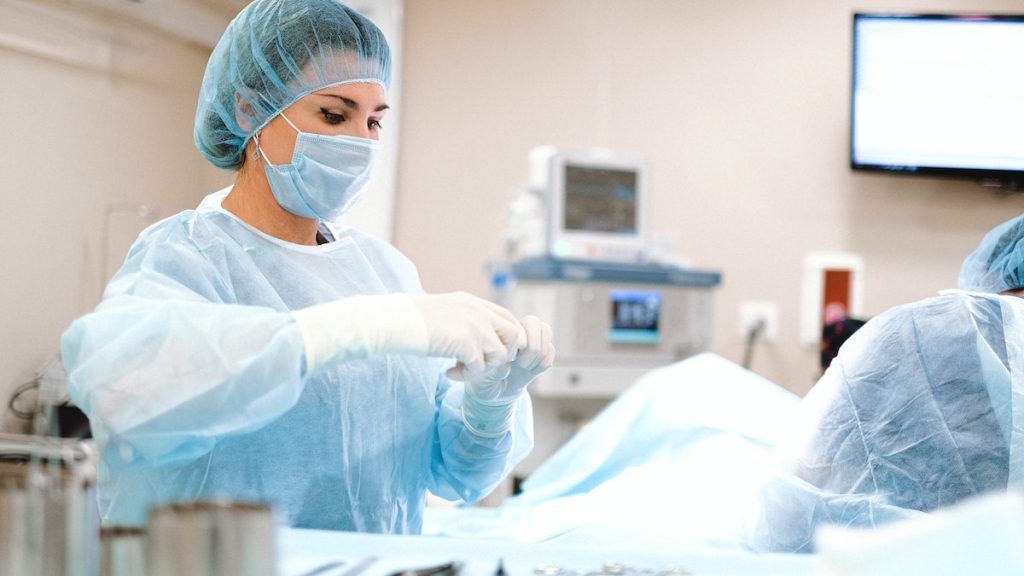The overall demand for nurses is growing, but especially for nurse practitioners (NPs). They are important contributors to both primary and specialized care and are able to skillfully bridge the gap between doctors and registered nurses (RNs). If you’re contemplating making the transition from working as a registered nurse to an NP, this article will explain each step along the way that you’ll need to take into consideration.
Table of Contents
The role of a nurse practitioner
To kick things off, let’s talk about what NPs do in their role. Their day-to-day responsibilities are diverse and extend well beyond those of RNs. A key distinction between RNs and NPs lies in their autonomy. Unlike RNs who work under the supervision of doctors, NPs have the authority to diagnose illnesses, manage patient care plans and even prescribe medicine in many states.
This expanded scope of practice covers many areas that were previously managed by physicians. In fact, depending on your state’s laws and regulations, you might not need physician oversight at all. This is a good thing. Giving NPs prescriptive authority makes the system more efficient and allows patients to access necessary treatments quickly.
NPs can specialize in a variety of areas, too, such as pediatrics and gerontology. Their role within healthcare teams will vary depending on their specialty, but there will typically be some kind of collaboration involved. NPs often work alongside pharmacists, social workers, dietitians and other professionals as part of multidisciplinary healthcare teams.
The evolution of the NP role over time has been impressive. It started out as a solution to the problem of a shortage of primary care physicians in rural areas, and today, it has expanded into a critical role within hospitals, clinics and nursing homes.
Educational pathways
In order to become an NP, there is usually prerequisite coursework that must be completed before you enter a program. The specifics of this can vary, but it often includes subjects such as biology, chemistry, anatomy and physiology, and psychology or sociology. Most programs will require experience as an RN, too, which has its own set of qualification requirements, including an associate or bachelor’s degree.
If you have a non-nursing bachelor’s degree and are hoping to transition into nursing, bridge programs are a good option. These are generally accelerated courses that combine RN licensure with advanced training to prepare you to work as an NP.
In terms of graduate education in nursing practice, there are three main options: Master’s degrees (MSN), Doctorate degrees (DNP) and certificate/post-graduate diplomas. MSNs tend to be more generalized, while DNPs provide deeper clinical expertise in addition to providing training in leadership skills that are required for higher-level roles within the world of healthcare. Certificate programs are primarily intended for existing NPs who are looking to specialize even further.
Choosing the right program is an important decision, and accreditation plays a significant role here. Accreditation ensures that your chosen course meets the national standards of quality and relevance and that you’re well-prepared for professional practice after graduation.
As online learning has become significantly more popular due to its flexibility and accessibility, many potential NPs are exploring distance learning options for their studies. This must be balanced with the need for clinical placement for nurse practitioner students, which is an extremely important part of their education. Reputable institutions such as Texas Woman’s University understand this balance well. Their MSN-FNP course involves online coursework, and complimentary clinical placement assistance in finding sites close to home as possible.
Certification and licensure

The next step in the process is achieving certification. This is the process of validating your competency level. It also impacts the scope of your practice and opens up employment opportunities. The American Nurses Credentialing Center (ANCC) and the American Association of Nurse Practitioners (AANP) are the two primary bodies that administer national certification exams for NPs.
These exams test your clinical knowledge in a variety of specialties, such as family medicine, gerontology, pediatrics and psychiatry. Understandably, preparing for these tests will require a lot of time spent studying both theoretical and practical aspects of your coursework. The certifying bodies provide study materials, too.
You need to be aware that licensure isn’t solely about passing exams either. You must also meet specific prerequisites, including completing clinical hours under supervision. Your nursing program will detail how many hours are needed, but you can generally expect between 500 to 1,500 hours, depending on your chosen specialization. This is quite a lot of time, so make sure you plan ahead and think about where and when you’ll complete these hours.
After you’ve successfully passed a national exam, you then need to tackle state licensure. Although there are similarities, states tend to do things a bit differently from each other, so what this specifically entails will come down largely to where you’re based or planning to practice from. What a state license will allow you to do varies as well. Some states allow full independent practice, while others may require physician oversight even after you’ve obtained advanced degrees. This type of situation can be extremely frustrating for NPs, so make sure to consider what the laws are in the state you’re planning to practice in.
Another consideration is that maintaining your certification also requires that you recertify every five years through continuing education units. This involves professional development activities such as research participation or leadership roles within healthcare organizations, along with possible retesting, depending upon your specific situation.
Both the ANCC and AANP are great sources of support throughout your career, so don’t fret if this all seems daunting. They’ll offer you help to prepare for exams, meet renewal requirements and stay updated on changes in regulations or practice standards. They can also be a great source for growing your network with other NPs.
Clinical experience and residency
Your coursework is complete, and so are your exams. You’re now a certified NP. What happens next? Hands-on clinical experience is the answer. This real-world practice helps you develop and polish all the essential NP skills you need.
Choosing the right clinical rotations is an important step. It can be a stepping stone to specializing in your favorite area of healthcare. No matter what specialty piques your interest, choosing rotations that align with these preferences will give you the best chance to learn and grow. To get the most out of these rotations, you must be dedicated and disciplined. Make sure you arrive prepared each day by reviewing any relevant material beforehand, and then get in there and absorb as much as you can.
NP residency programs are a relatively new invention and are a good way to bridge the gap between education and full-time practice. These programs offer structured support during this transition period while providing additional training within chosen specialties. The goal is to create more confident and skilled nurse practitioners.
If you’d like to try and gain diverse clinical experiences, you should focus on under-served areas where resources may be scarce but demand is high. Rural clinics and inner-city hospitals are good examples here, and they will expose you to different types of patients and conditions than what might typically be seen in mainstream settings.
Another significant component of this stage involves building relationships. This is true both within your cohort and among professionals already working within the field. Mentorship can be a good way to gain guidance from experienced NPs who’ve been exactly where you are now. Whether it’s managing stress during high-demand periods or learning which potential career paths to explore, mentors will be an invaluable resource.

The nurse practitioner job market
As we spoke about earlier in this article, the role of an NP is much more diverse today than it was when it started, and this growth and evolution is likely to continue. Healthcare policies, patient demographics and changes to technology can all alter the course of the NP role. It’s for this reason that NPs need to be open to trying new things and prepared to go with what society demands of them.
If we look specifically at the demand for NPs, an aging population coupled with an increasing emphasis on preventive care has been significant. NPs are now needed not only in hospitals but in outpatient clinics, too. They’re even sometimes needed in home healthcare roles. This trend is particularly pronounced in rural and other under-served areas where healthcare access remains a challenge.
When we consider healthcare policies, it becomes clear that they can reshape the world of NPs in all sorts of ways. The authority of NPs that was mentioned earlier is a perfect example of this. Full practice authority is only available in just over half of US states today, with the remaining states having different degrees of physician oversight required.
Salary must be considered, too. Although it can be uncomfortable, NPs need to be able to negotiate contracts and understand what type of salary they should expect. Geographic location, area of specialization and years of experience are all important factors that can dictate how strong your negotiating position is.
The rise of telehealth serves as a good example of how technology changes can affect healthcare. Although many businesses from all industries are clamoring for their employees to come back to the office, telehealth and remote medical consultations are here to stay. Some NPs could find themselves doing a lot of telehealth work, particularly those that work with rural populations.
Leadership roles are another option for NPs to keep an eye on. If you see yourself as a future department head, nursing administrator or even the Chief Nursing Officer of a huge facility, you should think about what skills are required and start to work on them.
Professional development and beyond
Speaking of skill development, even if you don’t see a career in leadership, it’s still important. Constantly improving and developing your professional skills is the best way to have a long and successful career.
The primary way to do this is to stay updated with the latest research in your area and incorporate the findings into your clinical practice. This is part and parcel of being an effective NP. This commitment to continuous learning will make you the best NP you can be and, by extension, improve the quality of care each patient you treat receives. When the opportunity presents itself, it’s a good idea to participate in research projects. They can help shape policies, improve service delivery models and even pioneer new treatment methods.
If you’ve spent some time early in your career as an NP and found an area you’d love to specialize in, consider pursuing advanced certifications. All the big specialties have advanced certifications that you can obtain, and this can only help you in your career. You might even find that you have a love for teaching and go down the path of academia in addition to your clinical work. Many NPs find immense satisfaction in educating future generations of nurses.
Engaging with professional organizations is another good way to help your career flourish. These types of bodies advocate for NPs at policy-making levels to ensure they are represented appropriately, and these impacts can have national or even global reach. These organizations are often great platforms for networking, too. You never know, a contact you make early in your career might end up being extremely valuable later on.
Conclusion
NPs often have extremely rewarding careers. They are called upon by many people and have a big impact on the lives of patients. It’s not an easy path, but it’s a worthwhile one. If you’re an RN contemplating your future, don’t be afraid to embrace the challenge.

Alex is fascinated with “understanding” people. It’s actually what drives everything he does. He believes in a thoughtful exploration of how you shape your thoughts, experience of the world.



